Honor Award
Ecology as Industry
Gyoung Tak Park, Student ASLA; Haein Lee, Student ASLA and Soomin Shin, Student ASLA,
Harvard University Graduate School of Design
Faculty Advisors: Pierre Bélanger, ASLA and Nina-Marie Lister
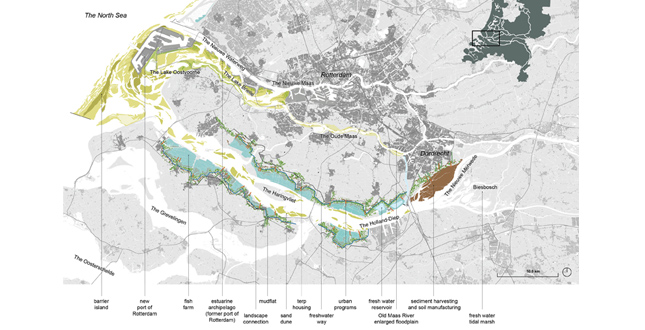
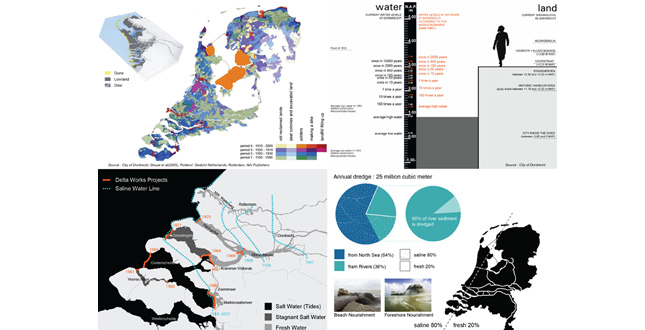 Close Me!
Close Me!"Man-made Low Lands"
Download Hi-Res ImagePhoto: Clockwise from top left: City of Dordrecht, Geuze et al(2005), Polders!: Gedicht Netherlands, Rotterdam, NAi Publishers; City of Dordrecht; G.P. van de Ven (1993), Man-made Lowlands, Uitgeverij Matrijs
Photo 2 of 16
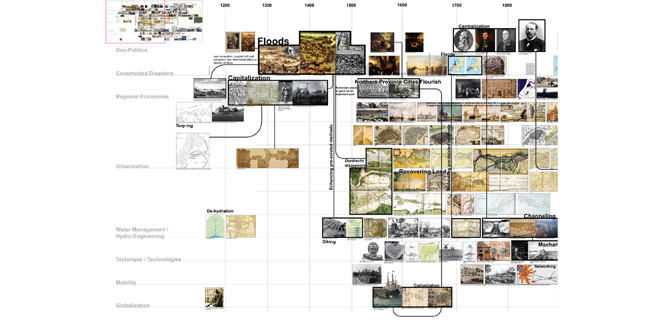
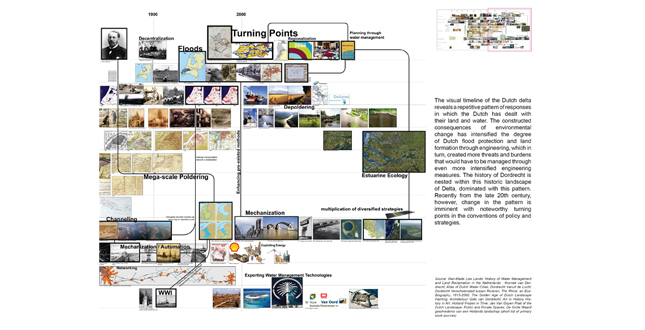
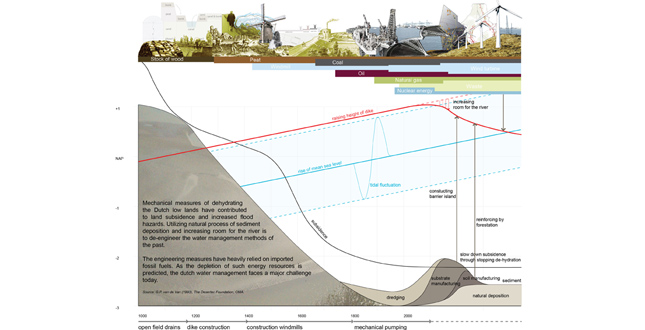
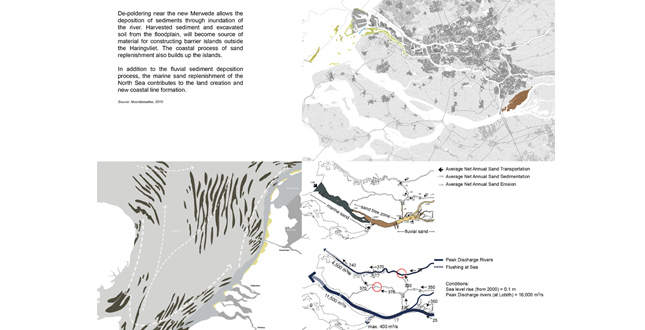
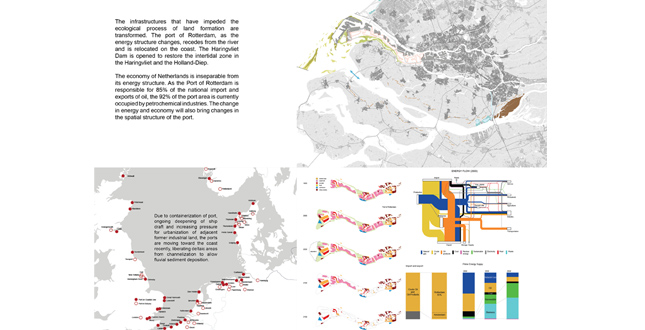 Close Me!
Close Me!Infrastructure Transformation
Download Hi-Res ImagePhoto: Gyoung Tak Park; Lower Right: Centraal Bureau voor de Statistiek, Port of Rotterdam
Photo 7 of 16
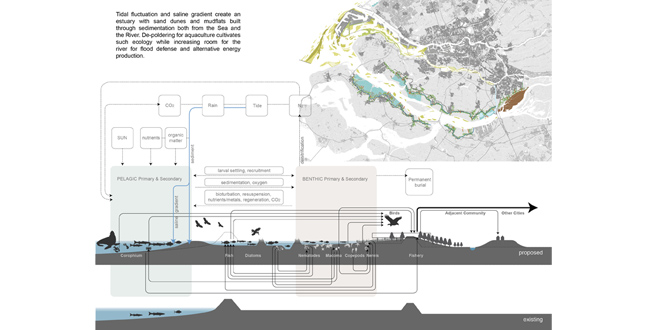
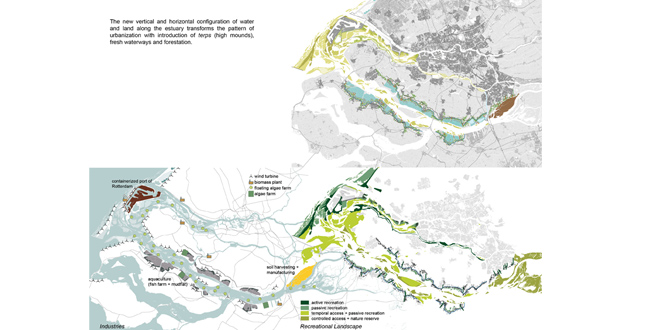
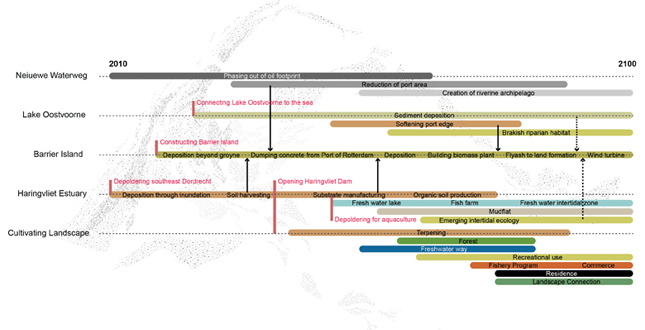
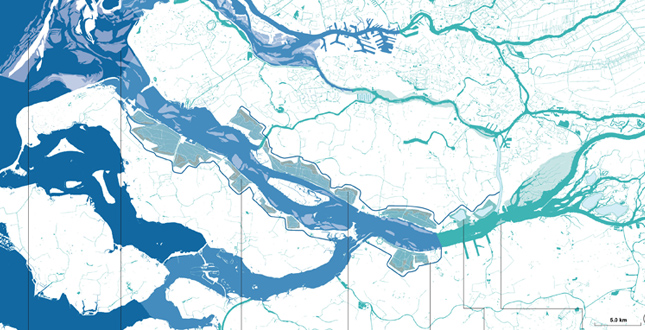
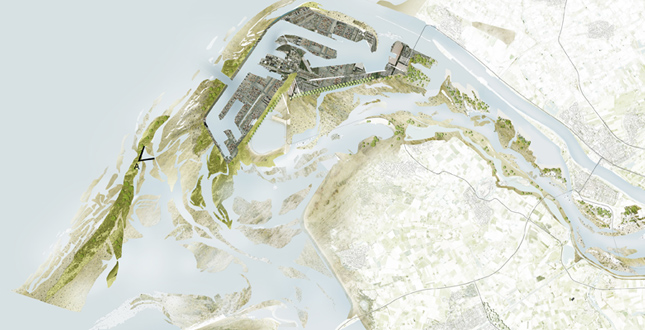
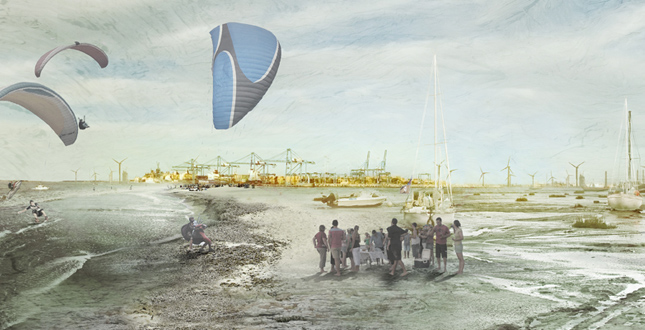 Close Me!
Close Me!Barrier Island for Recreation and the New Containerized Port of Rotterdam (View A)
Download Hi-Res ImagePhoto: Gyoung Tak Park
Photo 13 of 16
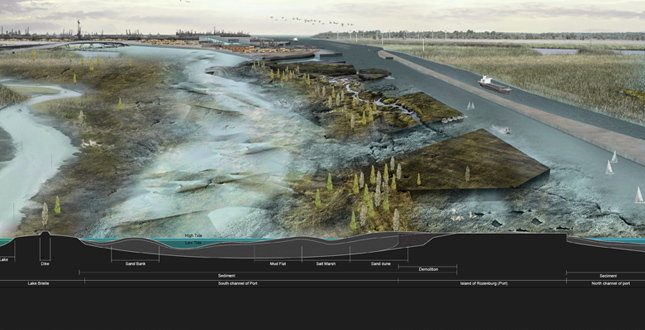
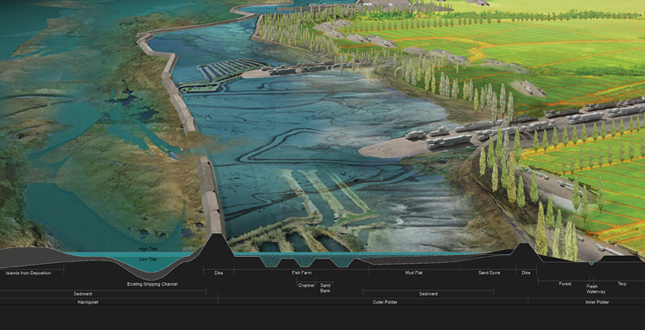
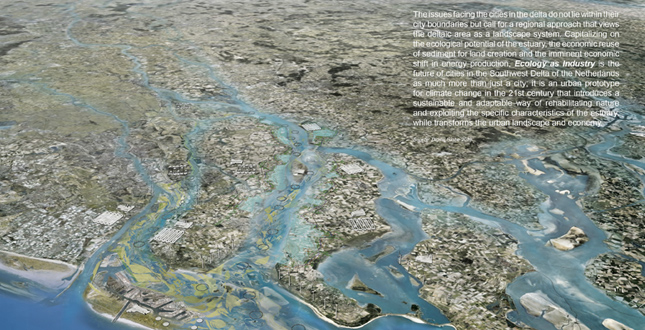
Project Statement
With climate change and changes in energy structure, the Netherlands is witnessing major challenges with its low lands and rising water level. Through de-engineering the Dutch water management, this project explores the effect on the urban landscape from the reuse of sediment for soil economies, diversification of energy resources and the potential for reducing on energy-intensive pumping systems that dangerously contribute to land subsidence and increased flood hazards. The ecology of estuaries becomes industry that builds land, informs new urban typology and generates energy.
Project Narrative
Man-made Lowlands (context)
The Netherlands is a low-lying country with a quarter of its land below sea level. Without tremendous investments for flood defense system, these low lands that produces about 70% of the national GDP is prone to flood hazards. The Southwest delta of the Netherlands, the delta of the Rhine-Meuse River near Rotterdam, is experiencing doubled flood potential due to the rising sea level and increased extreme climate conditions that causes river floods.
Landscape of Delta History (historical analysis)
A research on the history of the Dutch water management of over a thousand years reveals a repetitive pattern of responses in which they magnified and intensified the mechanical and engineering measures of flood defense and dehydration. Ironically however, while fighting against the flood potential, the evolution and advances of such engineering solutions expedited the subsidence of land that, in turn, increased the impact of flood hazards and required even higher level of infrastructural works. Energy is also an inseparable issue. The construction and maintenance of such civil-engineering measures have heavily relied on the import of fossil fuels, which is alarming as the depletion of non-renewable energy resources is imminent.
De-engineering (strategy)
The project Ecology as Industry is about de-engineering the Dutch water management, in order to decrease the gap between increasing flood hazard and land subsidence from both directions. Instead of raising dikes higher that only provides myopic and false sense of safety, utilizing natural processes of ecological system will build land through sedimentation on one hand and decrease flood potential by providing more room for the river on the other hand.
Processes—Four Transformations (interventions)
The project involves four areas of transformation that summarize the processes and interventions required with the subsequent changes, as below:
I. Coastal Transformation: The first step is to de-polder near the Nieuwe to allow deposition of sediments through inundation of the river. Harvested sediment and excavated soil from this floodplain will become source of material for constructing barrier islands outside the Haringvliet in the North Sea. The North Sea’s coastal process of sand replenishment also builds up the islands to grow.
II. Infrastructure Transformation: The infrastructures that have impeded the ecological process of land formation—the Port and the Dam - are deconstructed. Due to depletion of oil and with diversification of energy sources to renewable, most of the port of Rotterdam that are currently occupied by petrochemical industries will retrocede. Concurrently, the remaining function of containerized port will be relocated to the coast, liberating the delta from channelization and dredging to allow fluvial sedimentation. With protection from storm surge provided by the barrier islands, the Haringvliet Dam will be opened to restore the intertidal zone in the Haringvliet and the Holland-Diep.
III. Estuarine Transformation: Tidal fluctuation and saline gradient create a productive estuary with sand dunes and mudflats built through sedimentation both from the Sea and the River. De-poldering for fish farms and mudflats is to cultivate such estuarine landscape altering the existing infrastructure of dikes and polders. Replacing the energy-intensive practice of agriculture, aquaculture becomes a land use that yields higher productivity with less required resources to maintain. Additionally, partially opened polders provide room for the river that increases the holding capacity of the river discharge in case of floods.
IV. Urban Transformation: The new vertical and horizontal configuration of water and land along the estuary transforms the pattern of urbanization with introduction of terps , fresh waterways and forestation.
Delta as Estuary, Beyond “Room for the River ”(effects)
As a result of these interventions, the two estuaries in the Oostvoorne and the Haringvliet form a new coastline through sedimentation process. With diversified saline gradient, such sediments restore diverse habitat including vegetated coastal plains, mud flats, salt marshes, brackish marshes and fresh water tidal marshes. Dredging and Damming will be no longer necessary for deep ship draft for the inland port. The island of Rozenburg will be deconstructed into a series of smaller islands that make up the estuarine archipelago that grows with the siltation process. To counterbalance the opening of the Haringvliet Dam, the room for the river is significantly increased through various de-poldering strategies including the Nieuwe Merwede’s soil harvesting site, fish farms along the Haringvliet, and the deconstructed port of Rotterdam. Moreover, this project goes beyond increasing room for the river, in that the de-poldering sites are designed toward cultivating the new landscapes, through new industries, aquaculture and alternative energy production (wind turbines on the coastline, biomass plants on the barrier islands, algae farms in the estuaries), which consequently informs changes in the urbanization of the deltaic area.
Ecology as Industry
The issues facing the cities in the delta do not lie within their city boundaries but call for a regional approach that views the deltaic area as a landscape system. Capitalizing on the ecological potential of the estuary, the economic reuse of sediment for land creation and the imminent economic shift in energy production, Ecology as Industry is the future of cities in the Southwest Delta of the Netherlands as much more than just a city; it is an urban prototype for climate change in the 21st century that introduces a sustainable and adaptable way of rehabilitating nature and exploiting the specific characteristics of the estuary, while transforms the urban landscape and economy.
Additional Project Credits





